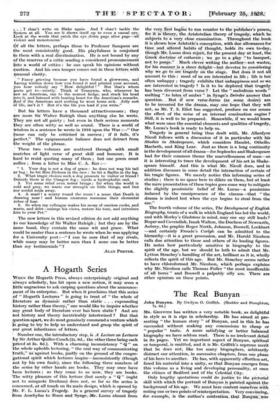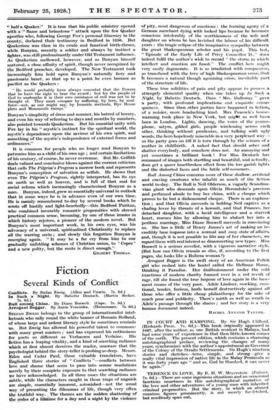The Real Bunyan
Ma. GnrFFrrn has written a very notable book, as delightful in style as it is ripe in scholarship. He has aimed at pre- senting " the human story " of Bunyan, and in this he has succeeded without making any concessions to cheap or "
popular " taste. A more satisfying or better balanced biography we have seldom read. There :is no irrelevant detail in its pages. Yet no important aspect of Bunyan, spiritual or temporal, is omitted, and it is Mr. Griffith's supreme merit that he does not, like too many biographers, arbitrarily distract our attention, in successive chapters, from one phase of his hero to another. He has, with apparently effortless art, fused his material into a unity, so that Bunyan emerges from this volume as a living and developing personality, at once
the citizen of Bedford and of the Celestial. City, _ Only lengthy quotations could do justice to the pictorial skill with which the portrait of Bunyan is paintedagainstAhe background of his age. We must here content. ourselves with noting one or two points Of reinterpretation: Very convincing, for. example, is the.-author's contention-that Bunyafi....Was " half a Quaker." It is true that his public ministry opened with a " flame and brimstone " attack upon the few Quaker apostles who, following George Fox's personal itinerary in the county, declared their testimony in Bedford in 1856. But Quakerism was then in its crude and fanatical birth-throes, while Bunyan, recently a soldier and always by instinct a fighter, was still predominantly under Old Testament influence.
As Quakerism mellowed, however, and as Bunyan himself matured, a close affinity of spirit, though never recognized by the Bedford preacher, developed. The New Testament took increasingly firm hold upon Bunyan's naturally fiery and passionate heart, so that up to a point he even became as pacifist as the Quakers :
He would probably have always conceded that the Powers that be have the right to bear the sword ; but for the people of God to unsheathe it in their own resistance of evil was not to be thought of. They must conquer by suffering, by love, by soul- force—not, as one might say, by Ironside methods, Rye House plots and Monmouth risings."
Bunyan's simplicity of dress and manner, his hatred of luxury, and even his way of referring to days and months by numbers, also pointed towards Quakerism. But his essential unity with Fox lay in his " mystic's instinct for the spiritual world, the mystic's dependence upon the saviour of his own spirit, and something of the mystic's independence of external forms and ordinances."
It is common for people who no longer read Bunyan to patronize him as a child of his own age ; and certain limitations
of his century, of course, he never overcame. But Mr. Griffith deals valiant and conclusive blows against the current criticism that calls The Pilgrim's Progress a narrow book and represents Bunyan's conception of salvation as selfish. He shows that even The Pilgrim's Progress, rightly interpreted, has its eye on earth as well as heaven, and is full of that zeal for social reform which increasingly characterized Bunyan as a
man. Bunyan, indeed, grew so essentially universal in outlook that in some ways he is in advance even of our own time.
He is mainly remembered to-day by several books which he wrote off hastily and light-heartedly--this Bedford Puritan, who combined incurably romantic propensities with shrewd practical common sense, becoming, by one of those ironies in which history rejoices, a pioneer of the modern novel. But Bunyan's most important work, in his own eyes, was his advocacy of a universal, spiritualized Christianity to replace all the warring sects ; and slowly this forgotten Bunyan is emerging again. " It may be a far cry from him to our gradually unfolding schemes of Christian union, to Copec ' and a new polity, but the route is direct enough."
GILBERT THOMAS.









































 Previous page
Previous page